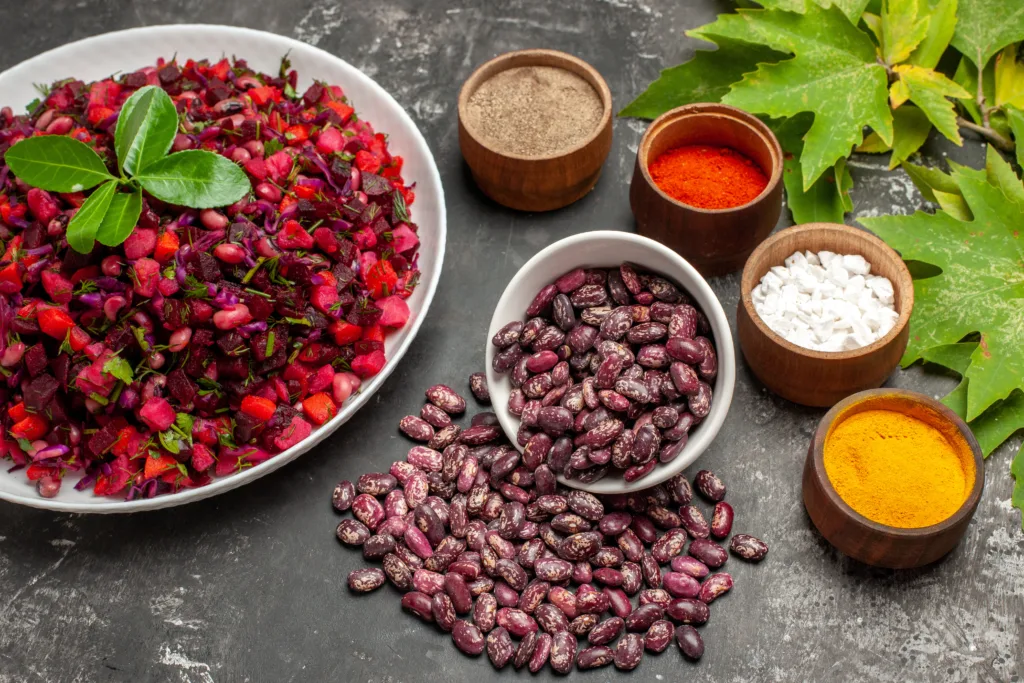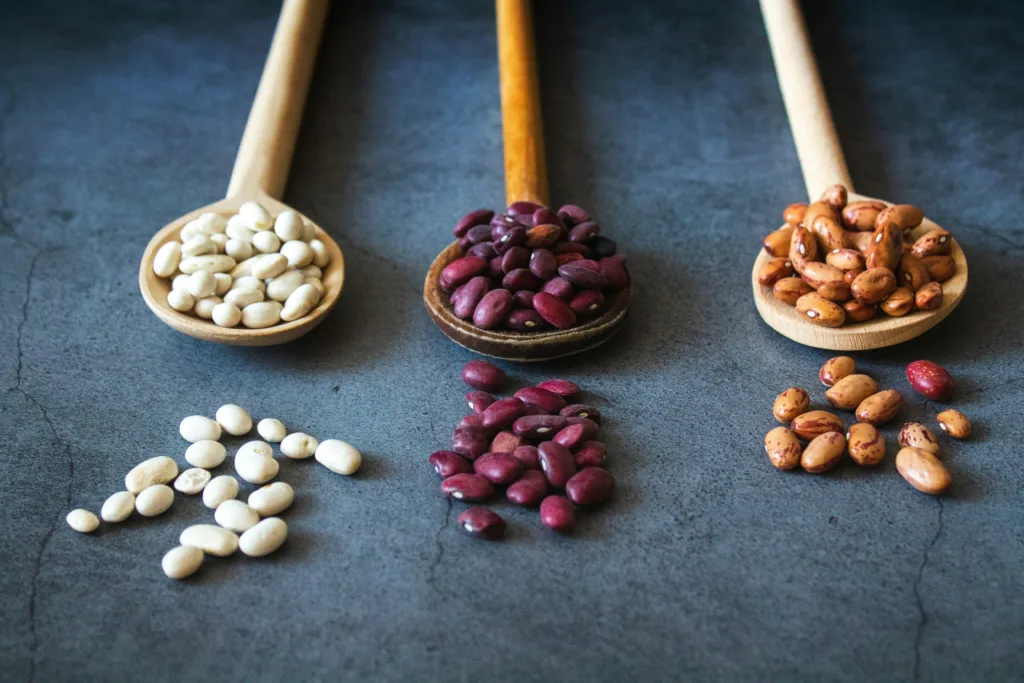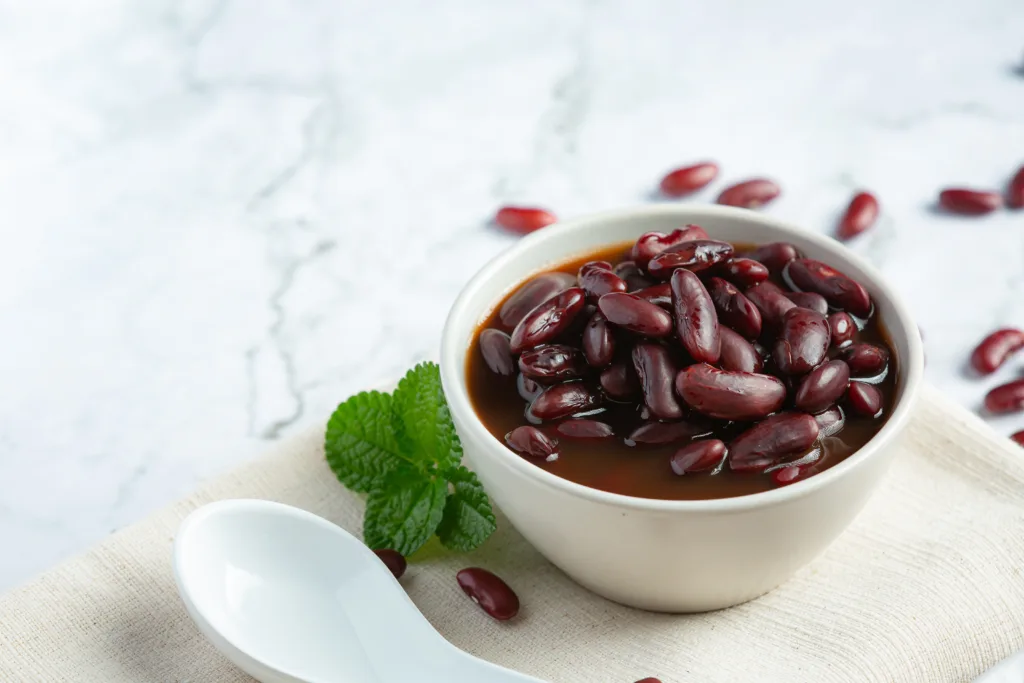In the realm of legumes, kidney beans stand out as nutritional powerhouses packed with essential nutrients and health benefits. Known scientifically as Phaseolus vulgaris, these beans are revered for their versatility in cooking, rich flavor, and numerous health advantages. From promoting heart health to aiding in weight management, kidney beans offer a plethora of benefits that make them a staple in various cuisines worldwide.

Nutritional Profile of Kidney Beans
One cup (177 grams) of cooked kidney beans provides approximately:
- Calories: 225
- Protein: 15 grams
- Fat: 0.9 grams
- Carbohydrates: 40 grams
- Fiber: 11 grams
- Folate (B9): 23% of the Daily Value (DV)
- Iron: 20% of the DV
- Magnesium: 13% of the DV
- Potassium: 11% of the DV
Health Benefits of Kidney Beans
1. Rich Source of Protein
Kidney beans are renowned for their high protein content, making them an excellent choice for vegetarians and vegans looking to meet their protein needs. Just one cup of cooked kidney beans provides approximately 15 grams of protein, contributing to muscle growth, repair, and overall health.
2. Fiber-Rich
Fiber is crucial for digestive health, and kidney beans are abundant in both soluble and insoluble fiber. Consuming adequate fiber promotes regular bowel movements, prevents constipation, and aids in weight management by promoting satiety.
3. Heart Health
The soluble fiber present in kidney beans helps lower cholesterol levels, reducing the risk of heart disease. Additionally, they contain antioxidants such as flavonoids, which combat inflammation and oxidative stress, further supporting cardiovascular health.
4. Blood Sugar Regulation
With a low glycemic index, kidney beans assist in stabilizing blood sugar levels, making them an excellent choice for individuals with diabetes or those aiming to manage their blood sugar levels effectively.
5. Nutrient Density
Kidney beans are packed with essential vitamins and minerals, including folate, iron, magnesium, and potassium. These nutrients play vital roles in various bodily functions, such as cell metabolism, oxygen transport, and muscle function.
6. Weight Management
Due to their high fiber and protein content, kidney beans can help promote satiety and reduce overall calorie intake, making them a valuable component of weight management diets. Research suggests that incorporating legumes like kidney beans into meals can contribute to feelings of fullness and aid in weight loss efforts.
7. Anti-Inflammatory Properties
Kidney beans contain phytochemicals and antioxidants that exhibit anti-inflammatory properties, which can help reduce the risk of chronic diseases associated with inflammation, such as arthritis, diabetes, and certain cancers. Regular consumption of kidney beans as part of a balanced diet may contribute to overall well-being and disease prevention.
8. Digestive Health
The fiber content in kidney beans supports digestive health by promoting regularity and preventing constipation. Additionally, the resistant starch present in beans acts as a prebiotic, nourishing beneficial gut bacteria and promoting a healthy gut microbiome.

Varieties of Kidney Beans
1. Red Kidney Beans
Perhaps the most common variety, red kidney beans boast a rich, robust flavor and are a staple in dishes like chili, soups, and salads. They retain their shape well when cooked, making them ideal for hearty recipes.
2. White Kidney Beans (Cannellini Beans)
White kidney beans have a milder flavor compared to their red counterparts and are popular in Mediterranean cuisine. They work well in salads, stews, and pasta dishes, adding a creamy texture and subtle taste.
3. Black Kidney Beans
Black kidney beans, also known as black beans, are smaller in size and have a slightly sweeter flavor. They are commonly used in Latin American and Caribbean dishes, such as rice and beans, soups, and burritos.

Culinary Uses of Kidney Beans
1. Chili Con Carne
Kidney beans are a key ingredient in the classic Tex-Mex dish, chili con carne. Combined with ground beef, tomatoes, onions, and spices, kidney beans add texture, flavor, and nutritional value to this hearty stew.
2. Bean Salads
Kidney beans are a fantastic addition to salads, providing protein and fiber to make them more filling and nutritious. Combine kidney beans with vegetables, herbs, and a tangy dressing for a refreshing and satisfying salad.
3. Bean Burgers
For a vegetarian alternative to traditional burgers, kidney beans can be mashed and formed into patties. Seasoned with spices and herbs, bean burgers offer a flavorful and protein-packed option for meatless meals.
4. Soups and Stews
Kidney beans add substance and depth to soups and stews, enhancing both flavor and nutritional value. Whether in a hearty minestrone or a spicy jambalaya, these beans contribute to a satisfying and nourishing dish.
Conclusion
Incorporating kidney beans into your diet offers a myriad of health benefits and culinary possibilities. Whether you prefer them in savory stews, vibrant salads, or comforting soups, kidney beans provide a nutritious and delicious addition to any meal. With their versatility and nutritional value, it’s no wonder these legumes have earned a permanent place in kitchens around the world. Embrace the power of kidney beans and elevate your cooking and well-being simultaneously.
Topics covered:
- What are Kidney beans?
- What are health benefits of Kidney beans?
- What is nutritional profile of Kidney beans?
- Uses of Kidney beans
- Culinary Uses of Kidney Beans






